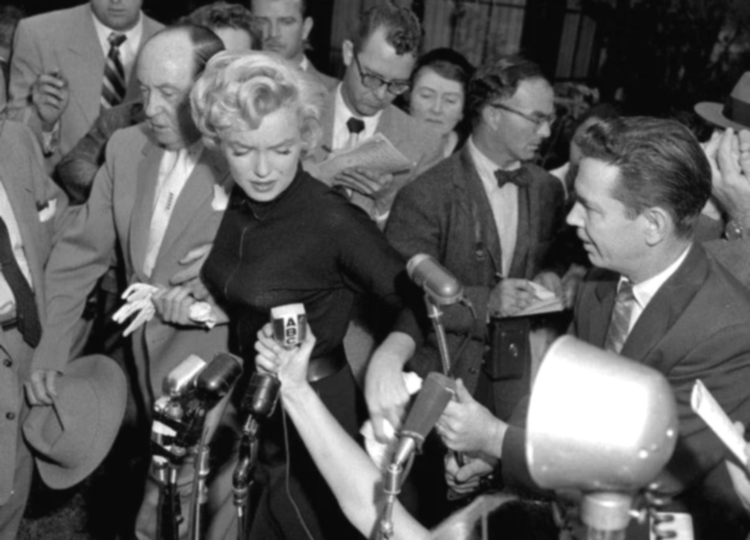An Uncharacteristic Reprisal
Marilyn Monroe was one angry woman, as the story goes; and she was going to excise a pound of flesh for the way she had been mistreated by John and Robert Kennedy and all the other evil and heartless men with whom she had fallen hopelessly in love. So goes the idiom: Hell hath no wrath like a woman scorned. In My Story, however, Marilyn’s unfinished memoir, she wrote about her first husband, Jimmie Dougherty, in a rather matter-of-fact manner: she noted that her marriage to Dougherty was neither happy nor sad; the relationship was not painful; they seldom spoke and not because they were necessarily angry with each other: they simply had nothing to say. The only public statement she ever made about her marriage to Dougherty, according to Donald Spoto, was also rather matter-of-fact: she merely commented that her marriage was a mistake, leading to divorce and that her former husband had remarried (Spoto 109).
During the press conference to announce her separation and pending divorce from Joe DiMaggio, she tearfully told a reporter that she could not speak about her private life. She never said a word publicly about DiMaggio’s spousal abuse or his often violent behavior; and regarding her marriage to Arthur Miller, she remarked that speaking about Miller would be indelicate and she felt as if she would be trespassing. She always spoke highly of Miller; she called him wonderful and asserted that he was a great writer while also stating that everybody I ever loved, I still love a little (Spoto 455). As usual, Marilyn did not express any animus about Miller regardless of how she may have actually felt or what she might have actually believed. Not once in her life did she speak publicly in a vengeful or hurtful way about past lovers or former husbands. Always the very essence of decorum and generosity, she only spoke of such issues when pressured by nosy and voyeuristic, insistent reporters; and even in those situations, when she actually spoke about her private life, what she actually said never revealed much at all. As Pat Newcomb correctly observed, what Marilyn revealed about her private life she revealed to a few select confidants, only; and she went to great lengths to protect her privacy. She had neither a desire nor a need to justify herself in a public manner.
In fact, Marilyn demanded discretion and even silence from her most intimate friends and she would forsake those who violated her privacy without her knowledge and approval. Publicly washing her dirty laundry or airing private grievances would have been uncharacteristic for Marilyn. According to Whitey Snyder, Marilyn never spoke badly to or about anyone, neither photographers nor reporters nor even former lovers; and calling a press conference of the type alleged would have been incredibly and laughably uncharacteristic (Spoto 539).
Much later, many years after Marilyn’s death, several persons who claimed a friendship with her offered their recollections of how she actually felt and what she actually said about her three former husbands in an attempt to prove that Marilyn could be mean and she could be vindictive, in an attempt to suggest that Marilyn had, in fact, planned a nasty press conference. Those statements, however, have no evidentiary value whatsoever and do not prove in any form or fashion that Marilyn was actually going to hold a press conference and reveal a relationship with, and a breach of promise by, John or Robert Kennedy.


